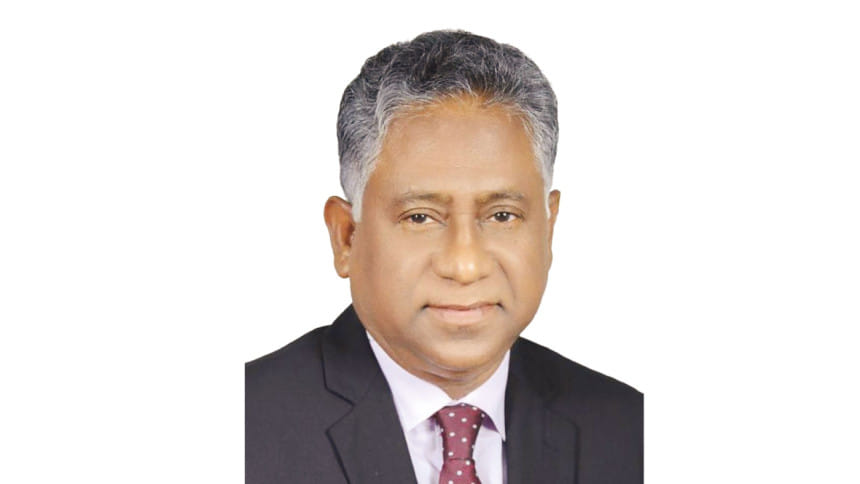Sustainability ingrained in operations and culture

A K M Shahnawaj
Managing Director (Current Charge), Dhaka Bank
The Daily Star (TDS): How would you evaluate the current state of sustainable banking in Bangladesh?
A K M Shahnawaj (AKMS): Sustainable banking in Bangladesh has made remarkable strides in recent years, transitioning from a niche concept to a core strategic priority within the financial sector. The pivotal role of Bangladesh Bank — through its sustainable and green finance guidelines, refinancing facilities for renewable energy and energy-efficient projects, and mandatory sustainability reporting — has been instrumental in accelerating this growth. At Dhaka Bank, we have wholeheartedly embraced these initiatives, embedding environmental, social, and governance (ESG) considerations deeply into our lending and investment decisions.
While sustainable finance currently represents a growing segment of the credit market, the foundation is firmly in place for rapid expansion. With increasing awareness, advancing technical capacity, and evolving transition finance, we are confident that Bangladesh is well positioned to scale sustainable finance significantly to meet its climate and sustainable development goals. The progress so far inspires optimism for a green and resilient future.
TDS: What sustainable financing/refinancing schemes does your bank offer, particularly for SMEs, women entrepreneurs, or other environmentally responsible enterprises?
AKMS: Dhaka Bank is deeply committed to promoting sustainable finance and actively participates in Bangladesh Bank's refinancing initiatives targeting renewable energy, particularly solar power, energy-efficient machinery, waste management, effluent treatment, and eco-friendly industrial projects. For sectors such as Ready-Made Garments and large-scale manufacturing, we leverage programmes including the Refinance for Environment-Friendly Green Projects, the Technology Development Fund, and the Green Transformation Fund to facilitate the adoption of energy-efficient technologies.
For SMEs, we provide access to government and central bank refinance schemes, including the Tk. 25,000 crore CMSME programme at 7% interest, the agro-processing refinance facility, and the SME Foundation's revolving fund at 6%. Additionally, our Start-up Fund offers young entrepreneurs concessional loans of up to Tk. 80 million at just 4% interest.
We also provide targeted financing for businesses in rural areas, marginal traders, and women entrepreneurs, with concessional rates as low as 5%, including our Oditiya Loan designed specifically for women entrepreneurs.
Through these efforts, Dhaka Bank aims to promote inclusive growth and contribute to Bangladesh's sustainable development.
TDS: What initiatives has your bank undertaken to promote sustainable banking, and what measures have you implemented to reduce your own carbon footprint?
AKMS: At Dhaka Bank, sustainability is deeply ingrained in both our operational framework and corporate culture. We have dedicated Sustainable Finance Help Desks in every branch to integrate environmental, social, and governance (ESG) risk assessments into our credit appraisal processes through the Environmental and Social Due Diligence (ESDD) matrix.
Furthermore, training and awareness programmes are conducted to cultivate sustainability-mindedness among employees, ensuring accountability and engagement throughout the organisation.
Internally, we have implemented several initiatives to reduce our carbon footprint. These include digitising workflows — for example, adopting a "go green" approach for bill collection — to significantly lower paper consumption, and upgrading to energy-efficient lighting across our branch network.
Moreover, Dhaka Bank has recently partnered with the Partnership for Carbon Accounting Financials (PCAF) to enhance our capacity for measuring and managing financed emissions. This collaboration underscores our commitment to transparency and accountability in assessing the environmental impact of our loan and investment portfolios, positioning us among the pioneers in Bangladesh to adopt globally recognised carbon accounting standards.
TDS: What challenges has your bank encountered in adopting and promoting sustainable banking practices?
AKMS: We face several challenges. Many borrowers lack the technical capacity to develop green projects and often perceive sustainable technologies as costly with delayed returns. The absence of standardised ESG data complicates impact assessment and risk evaluation. Although Bangladesh Bank's refinancing schemes are beneficial, the local market for green bonds and sustainability-linked loans is still emerging, limiting financing avenues for large-scale initiatives. Moreover, cultivating a sustainability mindset among clients and staff requires sustained education and incentives.
TDS: What are your bank's future plans to advance sustainable banking, and what support do you seek from the government?
AKMS: Our strategy focuses on three key pillars: scaling, innovation, and partnership. We plan to increase our green financing portfolio substantially, focusing on renewable energy generation, climate-resilient infrastructure, sustainable agriculture, and energy-efficient industrial modernisation.
We intend to introduce innovative financing instruments such as sustainability-linked loans, where borrowers receive better terms for meeting ESG targets, and explore partnerships with international climate funds to secure concessional financing for Bangladesh's green transition.
In terms of government support, fiscal incentives such as tax breaks for green investments, import duty exemptions on eco-friendly technologies, and targeted grants or subsidies will catalyse private sector participation. Capacity-building programmes are also vital — training entrepreneurs, stakeholders, and bankers in sustainable practices ensures long-term market growth and effectiveness.
A supportive, predictable regulatory environment combined with targeted incentives will be crucial for mobilising private capital at scale to meet the country's ambitious sustainable development goals.

 For all latest news, follow The Daily Star's Google News channel.
For all latest news, follow The Daily Star's Google News channel. 



Comments